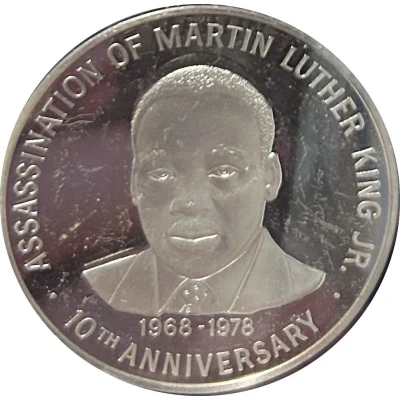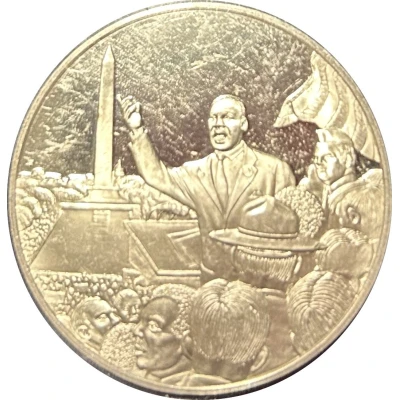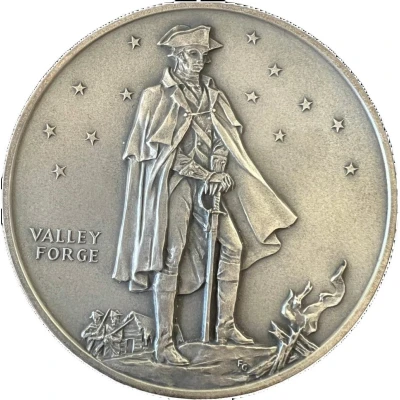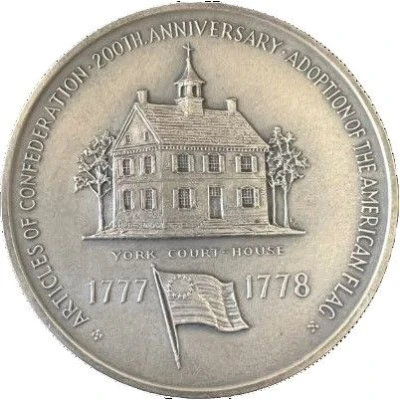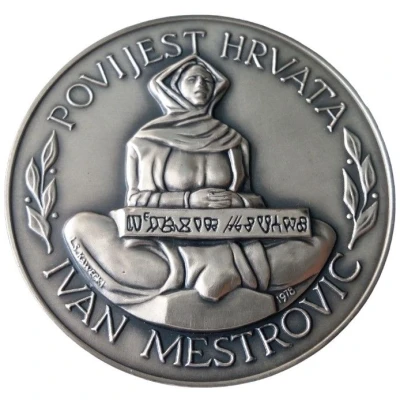
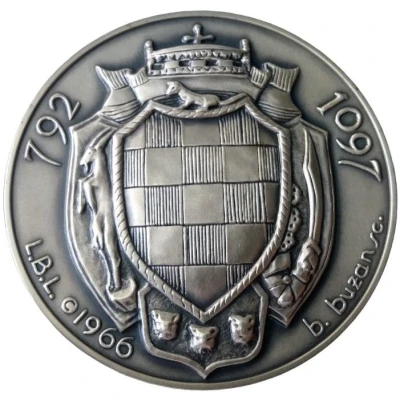

Medal - History of Croats silver
1978 year| Silver (.999) | 168 g | 70 mm |
| Location | United States |
|---|---|
| Issuing entity | Medallic Art Co. |
| Period | Federal republic (1776-date) |
| Type | Medals › Commemorative medals |
| Year | 1978 |
| Composition | Silver (.999) |
| Weight | 168 g |
| Diameter | 70 mm |
| Shape | Round |
| Technique | Milled |
| Orientation | Medal alignment ↑↑ |
| Updated | 2024-11-13 |
| Numista | N#396278 |
|---|---|
| Rarity index | 100% |
Reverse
Emblem of the Croatia containing historically significant symbols.
On top of the emblem is The Old Croatian crown, often called Tomislav's crown or Zvonimir's crown, which is a term that, in addition to the physical crown, also denotes the virtual crown and the Croatian Kingdom.
Below the crown is a marten (Croatian: kuna), animal whose fur was used for trade and payment of customs duties in the Croatian provinces of Slavonia and Primorje (today's Kvarner and Istria) since at least early 11th century. Based on this, Croatian kuna was a currency in Croatia from 1994.-2022.
On the left side is artistic depiction of the coat of arms of Istria (buck goat)
On the right side artistic depiction of coat of arms of Bosnia and Herzegovina during Austro-Hungary (hand holding a sabre).
At the bottom is artistic depiction of the coat of arms of Dalmatia (three lion heads).
Script: Latin
Lettering:
792
1097
L.B.L. ©1966
b. buzan sc.
Translation:
792
1097
L.B.L. ©1966
Boris Bužan sculptor
Engraver: Boris Bužan
Edge
Plain with inscription
Script: Latin
Lettering: MEDALLIC ART CO. DANBURY. CT. - .999 FINE SILVER
Translation: Medallic Art Company, Danbury, Connecticut
Comment
Medallic Art Company, Ltd. based in Dayton, Nevada was at one time "America's oldest and largest private mint" and specialized in making academic awards, maces, medallions, along with chains of office and universities medals for schools. Henri Weil, "a highly respected French sculptor living in New York City," founded the Medallic Art Company in Manhattan in 1903. In 1972 the Medallic Art Company moved to Danbury, Connecticut, in 1991 moved again to Sioux Falls, South Dakota, and finally in 1997 to Dayton, Nevada.
Leon Stanley Kawecki (1921 – 2000) was a painter, sculptor and designer well known for his commemorative medals. He was born in Poland in 1921, and during the second world war he was with Polish Aremd Forces and spent time in a Russian prisoner-of-war camp. After the war, he worked a few years in Europe, then decided to move to the US, which he did in 1952 and became a US citizen in 1956. He received many honors for his work.
Boris Bužan, sculptor and medalist (born 17 February 1915. - died Laguna Beach, California, March 1982.). In 1930, he moved from what was then Austria-Hungary to the USA, studied at the National Academy of Fine Arts in New York, and was tutored by famous American sculptors, especially Ivan Meštrović. He created designs and covers for magazines, worked as a translator in the World War II Bureau of Censorship in New York. He excelled in ceramic art and medal making. He created many public frescoes, of which unfortunately only one has survived.
